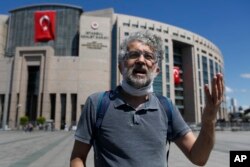A Turkish court has agreed to consider a request to disqualify one of the judges overseeing the trial of a media advocate.
The case in question involves Erol Onderoglu, the Turkish representative for media watchdog Reporters Without Borders (RSF), who is on trial alongside journalist Ahmet Nesin and human rights defender Sebnem Korur Fincanci.
All three are accused of terror-related charges over their role as guest editor at the pro-Kurdish newspaper Ozgur Gundem in early 2016.
A Turkish court later in 2016 ordered the closure of Ozgur Gundem on accusations that the newspaper had links with the Kurdistan Workers' Party (PKK) and was spreading terrorist propaganda.
Washington and Ankara have both designated the PKK as a terrorist organization.
During an October 19 hearing, lawyers representing Onderoglu and his co-accused asked a court to remove Murat Bircan, one of the judges, because of his affiliation with President Recep Tayyip Erdogan's ruling Justice and Development Party (AKP).
Onderoglu told VOA that Bircan in 2018 was a candidate to run in the parliamentary elections for the AKP in the northern province of Samsun.
Because of that connection with Erdogan's party, Onderoglu said, appointing Bircan as a judge in the Ozgur Gundem case could create a sense of distrust in judicial independence.
"To trust the judicial process, the judiciary must be independent," Onderoglu told VOA. "There is a need for a self-sufficient and objective structure that carries out the disciplinary and appointment procedures by itself so that we can feel more secure as defendants."
VOA tried to submit a request to the AKP for comment via its web portal, but the online form was not working.
Authorities first filed charges against Onderoglu in June 2016, and detained the media advocate for 10 days.
In 2019, a court acquitted Onderoglu, Nesin and Fincanci, who is now chair of the Turkish Medical Association.
The following year, an appeals court overturned the acquittal.
That verdict came shortly after President Erdogan made comments about Fincanci's Turkish Medical Association, which had been critical of Ankara's response to the pandemic.
Erdogan did not directly name Fincanci, but in an address to his party in October 2020, he said the association's head came from "a terrorist organization" and asked parliament to take steps to rein in the group's influence.
"It was an ordinary case, but by overturning the acquittals with the intervention of President Erdogan, the case became a symbol of political interventions in the judiciary," Onderoglu said.
Onderoglu and his co-accused are now awaiting for the verdict in a retrial. If convicted, they could each be jailed for up to 14 years.
The presidential communications directorate did not respond to VOA's emails requesting comment.
VOA's emails seeking comment from Turkey's Justice Ministry which oversees Bircan's office, went unanswered.
Faruk Eren, head of the press union of the Confederation of Progressive Trade Unions of Turkey, said judicial independence is important.
"Many people are held in prisons by direct order of the executive branch. And in fact, the judiciary is most often used to silence journalists. In short, the judicial system has become an apparatus for the Erdogan government," Eren told VOA.
Turkey is one of the leading jailers of journalists globally, with at least 18 behind bars for their work at the time of the most recent prison census by the Committee to Protect Journalists.
Media analysts have accused Ankara of using terrorism and insult laws to jail opponents and critics.
In its press freedom index, RSF says, "Judges who do the government's bidding are trying to limit democratic debate by censoring online articles tackling corruption and similarly sensitive topics."
The watchdog ranks Turkey 149 out of 180 on its Press Freedom Index, where 1 denotes the best environment for media.
After six years of fighting a lawsuit and defending journalists harassed for their work, Onderoglu says he believes "Turkey has been a threatening place for not only journalists but also rights defenders."
"We know that we are in a period where it is essential to stand firm and to take a strong stance in favor of our colleagues who are trying to deliver news to the public by taking all the risks," Onderoglu told VOA.
While fighting to prove his innocence, Onderoglu is also following the proceedings of several hundred journalists in the courts.
"I am trying to minimize the effect of this trial on me so that I will not be affected too much in my daily work. Turkey is going through an extraordinary period in terms of transparency, and the fundamental rights of journalists to report must be firmly defended," Onderoglu said.
The lower court forwarded the request to disqualify the judge in his case to a higher court and adjourned the case until February 1.
This story originated in VOA's Turkish Service. Some information came from AFP.






